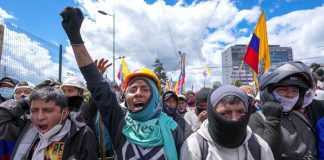A coup against Honduran president Manuel Zelaya has provoked protests throughout the country.
The response of the armed forces, which have taken control, was the imposition of a curfew and violence.
Zelaya has indicated his willingness to join a unity government with the coup leaders to solve the crisis, but no agreement had been reached as Solidarity went to press.
Repesentatives of the acting president installed by the coup were continuing to oppose Zelaya’s reinstatement as president.
Zelaya comes from the country’s right wing Liberal Party. He originally supported the Central American Free Trade treaty, which would have integrated the country into the global economic system.
In recent times however, he has played an increasingly prominent role in Alba, the Latin American alliance set up by Hugo Chavez, the radical president of Venezuela. Alba represents an alternative to the US’s neo-liberal plans for the continent.
Zelaya had recently raised the minimum wage and worked increasingly closely with Chavez and Bolivia’s Evo Morales in trying to build alternative economic structures and alliances.
It is that relationship that has provoked the country’s ruling class to move against Zelaya.
The immediate cause was the president’s decision to hold an unofficial referendum on the possibility of creating a new democratic constitution along Venezuelan lines.
The Supreme Court declared it illegal and the army withheld the ballot boxes.
Zelaya then dismissed the head of the armed forces and led a march on an airforce base to retrieve the boxes.
He was subsequently arrested and expelled from the country.
The constitution that Zelaya wanted to amend was passed in 1982, when Honduras was the base of operations used for attacks on the Sandinista revolution in Nicaragua.
Its government was a faithful defender of US interests in the region. Those who kicked out Zelaya are committed to maintaining a country in which 50 percent of the population live below the poverty line.
The new de facto president initially invited Zelaya back “as long as he breaks his links with Hugo Chavez”. The issues could hardly be clearer.
Protests
Honduras’s popular organisations have called on the people to resist the coup.
Protests against the coup in Honduras have continued despite vicious state repression.
Honduran police fired bullets and teargas at an unarmed demonstration, killing at least one person—a young man—and injuring many more.
The 1500-strong protest had gathered at the international airport in the Honduran capital, Tegucigalpa.
They hoped to welcome Zelaya back to the country.
But the military prevented his plane from landing at the airport and it was forced to fly on to El Salvador.
Tens of thousands of people have taken to the streets in protest since the coup. The shootings of demonstrators created a new wave of anger, which was met with yet more heavy repression.
“We came here to ask for freedom and look what they have done,” one protester said.
Roberto Micheletti, the former head of the country’s congress, has been installed an interim president. He has made it clear that he will cling on to power despite calls from the Organisation of American States for him to stand aside.
One of Micheletti’s first moves was to institute a curfew in an attempt to dampen down the protests.
Eyewitnesses said that police and soldiers had maintained a heavy presence on the night following the shootings—enforcing the curfew with metal poles and batons.
Yet protesters have vowed to continue their campaign to get Zelaya reinstated. There has been talk of a general strike.
The coup has been strongly condemned by leaders across Latin America.
But as previous attempted coups against Chavez have shown, the key question is what happens with the movement from below and whether the protests can spread deeper into the working class.
Socialist Worker UK





